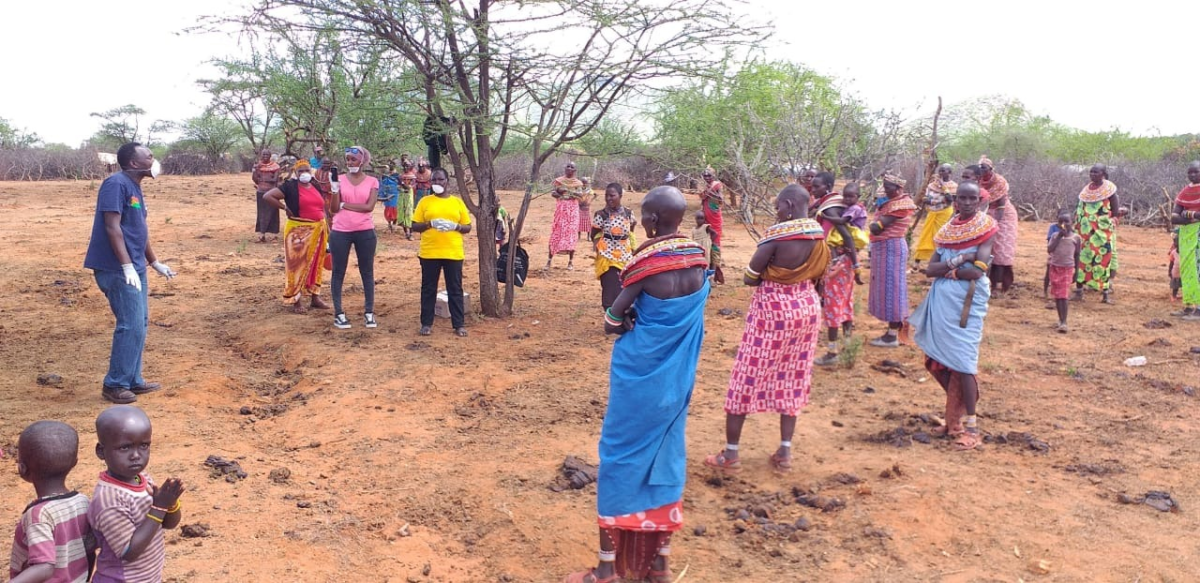
Last week, we had the opportunity to hear from our East Africa coordinator and our Kenya advisor, who are directly in touch with our network of grantees and advisors throughout Eastern Africa. Our conversation with Naomi Lanoi Leleto and Mali Ole Kaunga gave us some insights into how local people, and especially Indigenous communities, across East Africa are dealing with the COVID-19 pandemic.
Widespread issues in the region: Throughout Eastern Africa, open air markets have been closed down. These are places where Indigenous peoples can sell their livestock (goats, sheep and cows) and in turn get food, such as maize, flour, sugar, tea leaves and other produce, as well as household items, for their families. With the closure of these markets, hunger has become a real concern for a large portion of the population, and also impacts incomes as locals are not able to sell their livestock and wares. For many Indigenous communities and vulnerable communities, this has left them with limited access to food.
Madagascar: In Madagascar, 90% of the population is turning to traditional and herbal medicine to prevent the spread of COVID-19. One of the remedies that is being used, which is also endorsed by the President, is a treatment that has historically been used to treat malaria. Locals are inhaling eucalyptus and cinnamon, and drinking a tea of onion, garlic, ginger, lemon, and honey.
Kenya: One of our advisors in Kenya is calling attention to the environmental impacts of inappropriately disposing of personal protective equipment, including masks and gloves. While everyone in Kenya must wear masks or face a fine of $200, there is little to no information about how to dispose of used masks in a sanitary way. Some are washing used masks and repackaging them for resale, a risky practice.
In Northern Kenya, near the border with Ethiopia, the region has been severely impacted by drought in recent years. Now, with the rain has come a swarm of locusts, unseen before in anyone’s lifetime. In response to the locusts, local farmers are using pesticides, all of which are having a huge impact on access to food in the region, an issue that has already been exacerbated by COVID-19 and the closure of local markets.
Also, a considerable proportion of the Samburu and Maasai communities live in very small traditional huts with no running water, making social distancing and sanitation to prevent the spread of COVID-19 nearly impossible.
Among the Samburu and Laikipia Maasai, the traditional sacred rites of passage, which happen every ten years and induct young boys as community warriors, are currently being disrupted by COVID-19. Culturally, these ceremonies require the family and community to gather, and each boy is required to have a godfather, making social distancing a real challenge and almost impossible. Some of these rites of passage are being put on hold as a result. The lockdown is also negatively impacting other Indigenous traditions and rituals, including funerals. A recent case in Western Kenya saw traditional funeral rituals and burial practices being desecrated with the burials taking place at night without full participation by the relatives of the deceased.
Tanzania: The Pastoralist Women Council, a grantee, is providing awareness trainings to local women on the impacts of COVID-19. One of the main issues throughout the region is a lack of access to information about COVID-19, how it spreads, and how to prevent it. Many Indigenous communities and pastoralists don’t have radio or television, and aren’t receiving information from the government or cities. There is a huge rate of infection in Tanzania, but the government has been reluctant to impose a lockdown.
Uganda: In Uganda, the government has imposed a number of restrictions to stop the spread of COVID-19, including banning private cars from driving on the roads. There is also a curfew, which is enforced by police. As police are enforcing the curfew, incidents of police brutality and murders of civilians are surpassing the number of deaths caused by the virus.
These updates clearly showcase the destructive impact this pandemic is having on Indigenous communities and vulnerable populations throughout the region. With the collapse of economic and political systems, local people are struggling to survive, and for many the issues of food security, lack of income, risk of police brutality, and disruption of tradition are greater threats than the virus itself.
Our network continues to offer support, both in the form of grant money, time, and resources, to our grantees and we stand ready to help as communities weather the impacts of this storm and aim to rebuild in the future.
Consider making a donation today to help communities rebuild tomorrow.
